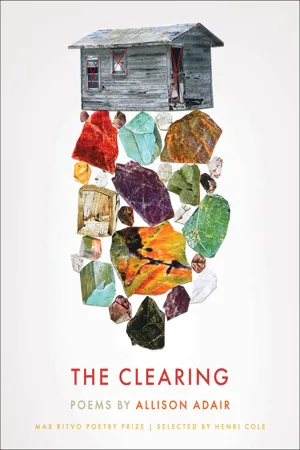
- 85 pages
- English
- ePUB (mobile friendly)
- Available on iOS & Android
About this book
A poetry debut that's "a lush, lyrical book about a world where women are meant to carry things to safety and men leave decisively" (Henri Cole). Luminous and electric from the first line to the last, Allison Adair's debut collection navigates the ever-shifting poles of violence and vulnerability with a singular incisiveness and a rich imagination. The women in these poems live in places that have been excavated for gold and precious ores, and they understand the nature of being hollowed out. From the midst of the Civil War to our current era, Adair charts fairy tales that are painfully familiar, never forgetting that violence is often accompanied by tenderness. Here we wonder, "What if this time instead of crumbs the girl drops / teeth, her own, what else does she have"? The Clearing knows the dirt beneath our nails, both alone and as a country, and pries it gently loose until we remember something of who we are, "from before... from a similar injury or kiss." There is a dark beauty in this work, and Adair is a skilled stenographer of the silences around which we orbit. Described by Henri Cole as "haunting and dirt caked, " her unromantic poems of girlhood, nature, and family linger with an uncommon, unsettling resonance. Winner of the 2019 Max Ritvo Poetry Prize Praise for The Clearing "A dark and bodily nod to folk- and fairy-tale energy." — Boston Globe "The poems in Adair's debut draw on folklore and the animal world to assert feminist viewpoints and mortal terror in lush musical lines, as when "A fat speckled spider sharpens / in the shoe of someone you need." — New York Times Book Review, "New & Noteworthy Poetry" "Like Grimms' fairy tales, Adair's poems are dark without being bleak, hopeless, or disturbing. Readers will find the collections lush language and provocative imagery powerfully resonant." — Publishers Weekly (Starred Review )
Tools to learn more effectively

Saving Books

Keyword Search

Annotating Text

Listen to it instead
Information
Table of contents
- Cover
- Title Page
- Copyright
- Dedication
- Contents
- The Clearing
- I
- II
- III
- Notes
- Acknowledgments
Frequently asked questions
- Essential is ideal for learners and professionals who enjoy exploring a wide range of subjects. Access the Essential Library with 800,000+ trusted titles and best-sellers across business, personal growth, and the humanities. Includes unlimited reading time and Standard Read Aloud voice.
- Complete: Perfect for advanced learners and researchers needing full, unrestricted access. Unlock 1.4M+ books across hundreds of subjects, including academic and specialized titles. The Complete Plan also includes advanced features like Premium Read Aloud and Research Assistant.
Please note we cannot support devices running on iOS 13 and Android 7 or earlier. Learn more about using the app